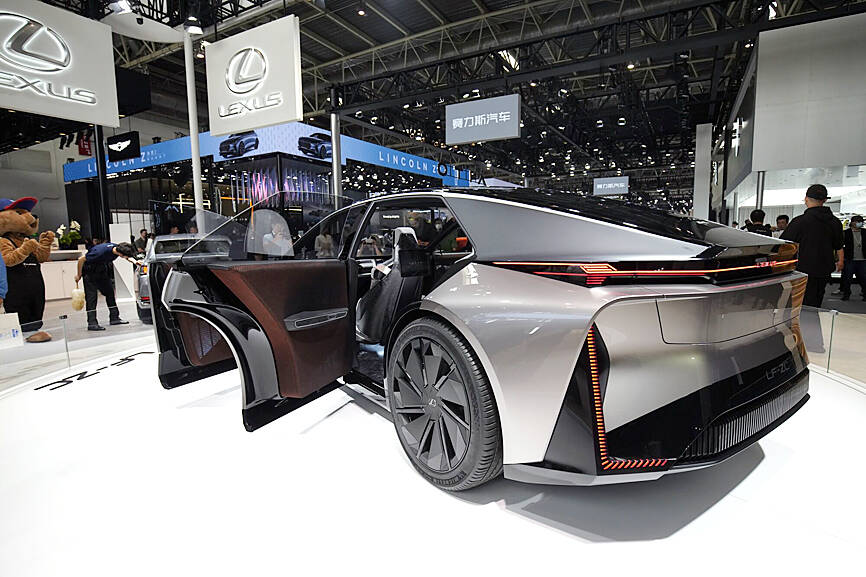Toyota Motor Corp plans to build an electric vehicle (EV) factory in Shanghai for its luxury Lexus brand, media reports said yesterday, at a time when many foreign automakers are struggling in China.
The world’s top-selling automaker aims to bring the factory online about 2027 and would operate it without a local partner, Japan’s Nikkei business daily said, citing sources.
That would make it the first Japanese vehicle factory of its kind in China, the Nikkei said.

Photo: Bloomberg
Toyota declined to confirm the plan when contacted.
Public broadcaster NHK said Toyota hoped that building the new plant would help it catch up in the Chinese market.
China overtook Japan as the biggest vehicle exporter last year, helped by its dominance in EVs, a sector where Japanese firms have lost ground by focusing on hybrid vehicles.
Honda Motor Co and Nissan Motor Co, Japan’s number two and three automakers after Toyota, on Monday agreed to launch talks on a merger to help them strengthen their position on EVs and self-driving tech.
Citing “dramatic changes in the environment surrounding both companies and the automotive industry,” Honda and Nissan said they plan to list a holding company in August 2026.
Lackluster consumer spending and tough competition in several markets is making life hard for many automakers.
However, Toyota’s strategy to offer a range of vehicles, including hybrids, has paid off in markets such as the US.
The planned Shanghai factory would mainly produce Lexus models, the Nikkei said, adding that Toyota mostly sells Japanese-made Lexus vehicles in China.

Anna Bhobho, a 31-year-old housewife from rural Zimbabwe, was once a silent observer in her home, excluded from financial and family decisionmaking in the deeply patriarchal society. Today, she is a driver of change in her village, thanks to an electric tricycle she owns. In many parts of rural sub-Saharan Africa, women have long been excluded from mainstream economic activities such as operating public transportation. However, three-wheelers powered by green energy are reversing that trend, offering financial opportunities and a newfound sense of importance. “My husband now looks up to me to take care of a large chunk of expenses,

SECTOR LEADER: TSMC can increase capacity by as much as 20 percent or more in the advanced node part of the foundry market by 2030, an analyst said Taiwan Semiconductor Manufacturing Co (TSMC, 台積電) is expected to lead its peers in the advanced 2-nanometer process technology, despite competition from Samsung Electronics Co and Intel Corp, TrendForce Corp analyst Joanne Chiao (喬安) said. TSMC’s sophisticated products and its large production scale are expected to allow the company to continue dominating the global 2-nanometer process market this year, Chiao said. The world’s largest contract chipmaker is scheduled to begin mass production of chips made on the 2-nanometer process in its Hsinchu fab in the second half of this year. It would also hold a ceremony on Monday next week to

TECH CLUSTER: The US company’s new office is in the Shalun Smart Green Energy Science City, a new AI industry base and cybersecurity hub in southern Taiwan US chip designer Advanced Micro Devices Inc (AMD) yesterday launched an office in Tainan’s Gueiren District (歸仁), marking a significant milestone in the development of southern Taiwan’s artificial intelligence (AI) industry, the Tainan City Government said in a statement. AMD Taiwan general manager Vincent Chern (陳民皓) presided over the opening ceremony for the company’s new office at the Shalun Smart Green Energy Science City (沙崙智慧綠能科學城), a new AI industry base and cybersecurity hub in southern Taiwan. Facilities in the new office include an information processing center, and a research and development (R&D) center, the Tainan Economic Development Bureau said. The Ministry

ADVERSARIES: The new list includes 11 entities in China and one in Taiwan, which is a local branch of Chinese cloud computing firm Inspur Group The US added dozens of entities to a trade blacklist on Tuesday, the US Department of Commerce said, in part to disrupt Beijing’s artificial intelligence (AI) and advanced computing capabilities. The action affects 80 entities from countries including China, the United Arab Emirates and Iran, with the commerce department citing their “activities contrary to US national security and foreign policy.” Those added to the “entity list” are restricted from obtaining US items and technologies without government authorization. “We will not allow adversaries to exploit American technology to bolster their own militaries and threaten American lives,” US Secretary of Commerce Howard Lutnick said. The entities